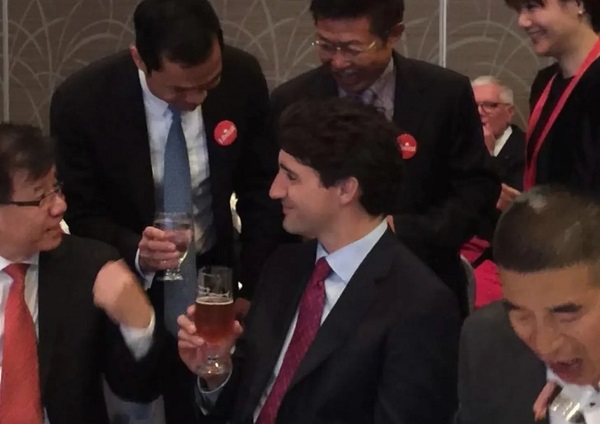espionage
In 2025 Critical Political Choices Will Define Canada’s Future: Clement

Justin Trudeau had a Liberal Party fundraiser in Vancouver with a number of Chinese Nationals that included individuals in United Front groups with official ties to Beijing, along with former Liberal multiculturalism minister and prominent party fundraiser Raymond Chan. Numerous donations into Trudeau’s personal Montreal election riding flowed after this Vancouver dinner.
Many Canadian politicians have forged unhealthy relationships with China; Ottawa must renew its most important partnership with the United States, former senior Mountie Garry Clement writes.
As Canada looks ahead to 2025, it stands at a crucial juncture, facing both unprecedented challenges and emerging opportunities. The nation’s evolving relationship with China, ongoing concerns about money laundering, the upcoming federal election, and its delicate position in U.S.-Canada relations present an intricate web of issues that will shape the country’s future. How Canada navigates these issues in the next year will determine not only its global standing but also its domestic harmony.
The China Challenge
Since the era of Pierre Elliott Trudeau, many Canadian politicians have forged what we now recognize as unhealthy relationships with China, enabling the country to interfere in our electoral process at all levels of government. This has provided an opportunity for Triads and Chinese Communist Party sympathizers to infiltrate Canadian society and Canadian politics.
In the past decade, Canada’s relationship with China has been strained, primarily due to geopolitical tensions and human rights concerns, but this has not resulted in any meaningful restrictions being placed on China by Canada. In 2025, this relationship will remain a balancing act—Canada must tread carefully between maintaining diplomatic and trade ties with a rising global power while aligning with Western allies who increasingly view China as a strategic adversary. Canadian politicians will also need to understand and accept that United Front Groups existing in Chinese diaspora communities across Canada have been shown to be allied with the Chinese government.
Canada’s foreign policy decisions will likely be influenced by developments in China’s global ambitions, particularly in areas such as the Belt and Road Initiative, the Taiwan issue, and its growing military presence in the South China Sea. The country’s relationship with China is at a crossroads, with growing calls for Canada to take a firmer stance on human rights issues, such as the treatment of Uyghurs in Xinjiang and Hong Kong’s autonomy. On the other hand, China remains a vital trading partner, especially in the context of Canada’s resource exports. Notwithstanding this, Canada will have a decision to make and hopefully it leans towards protecting Canada’s sovereignty.
Canada must also be prepared to reassess its foreign policy posture as the global balance of power continues to shift. The 2025 federal election could provide a pivotal moment in shaping public opinion on China and its place in Canada’s future.
We break international stories and this requires elite expertise, time and legal costs.
Money Laundering: An Ongoing Domestic and International Concern
Another pressing issue for Canada in 2025 is the continuing challenge of money laundering, particularly within its real estate and financial sectors. Internationally, Canada’s role in global financial markets means that it cannot afford to be complacent about illicit financial flows. Recent reports have highlighted how foreign actors, including from China, have used Canadian institutions to launder money and hide illicit funds.
The Cullen Commission highlighted that Canada has failed on so many fronts to ensure an effective and efficient legislative, enforcement, and prosecutorial regime existed for almost two decades, thereby making Canada an attractive venue for transnational organized crime groups. This has resulted in Canada having to prove that as a country we can combat money laundering if we want to shore up our failing international credibility. Failure to address these concerns will damage Canada’s reputation as a stable and transparent financial hub, while also complicating its relationships with other Western countries, including the United States. The government must intensify efforts to strengthen regulatory frameworks and enhance cross-border cooperation in financial crime prevention.
The Federal Election: A Fork in the Road
As 2025 approaches, Canada’s political landscape is increasingly polarized. The upcoming federal election promises to be a defining moment for the nation, as Canadians grapple with issues such as climate change, economic recovery post-COVID, affordability, and national unity. Without a doubt, I would argue the silent majority has been awakened and recognizes the past eight years of adopting a strong left-leaning stance has destroyed our reputation, thereby making us an easy target for President-elect Trump’s jibes and eventual pressure policies. The federal government will need to address voter concerns over Canada’s long-term economic health, our failed federal enforcement activity, and our weakened military.
At the same time, the political environment is also becoming more contentious, with rising populism and discontent in some regions. The election could see significant shifts in power, with both the Liberal and Conservative parties positioning themselves to address key issues such as national security, healthcare, and environmental sustainability. The outcome of this election will set the tone for how Canada navigates both domestic and international relations in the years to come.
U.S.-Canada Relations: A Symbiotic but Complex Partnership
Canada’s relationship with the United States remains the cornerstone of its foreign policy. As the world’s largest trading partner, the U.S. is integral to Canada’s economy. However, relations between the two countries are often fraught with tensions, from trade disputes to environmental policies. In 2025, this partnership will be tested further, particularly as both nations contend with the challenges of climate change, security concerns, and evolving trade agreements.
The U.S. presidential election in 2024 has already caused profound impacts on Canada’s policy decisions and political culture. While Canada and the U.S. share many common interests, the complexities of these issues—ranging from pipeline disputes to defense policy—will require sophisticated diplomacy to ensure the continued strength of this vital partnership.
Canada will also need to navigate the increasing pressure from the U.S. to align with its foreign policy stance, particularly in relation to China, Russia, and international trade agreements. While maintaining sovereignty is critical, Canada must ensure its policies do not continue to erode relations with its largest neighbor and closest ally.
A Year of Critical Decisions
Canada in 2025 faces a year of unprecedented decisions, with geopolitical tensions, financial integrity, and political stability all in play. The global stage is shifting, and Canada’s role within this changing landscape will depend on how effectively it addresses both internal challenges and external pressures. As the nation prepares for an important election and responds to global geopolitical shifts, it will need strong, visionary leadership to steer it through uncertain waters. Whether it is rethinking its relationship with China, confronting the realities of money laundering, or strengthening ties with the U.S., Canada’s future will depend on its ability to navigate this complex and interconnected world.
Ultimately, 2025 presents Canada with an opportunity to reassert its values, chart a clear course in the face of global uncertainty, and ensure that it remains a respected and influential player on the world stage.
Garry Clement consults with corporations on anti-money laundering, contributed to the Canadian academic text Dirty Money, and wrote Undercover, In the Shady World of Organized Crime and the RCMP
The Bureau is a reader-supported publication. To receive new posts and support my work, consider becoming a free or paid subscriber.
espionage
Trump says release the Epstein files

President Trump on Sunday urged House Republicans to vote to release any remaining government-held documents connected to Jeffrey Epstein, making clear he believes it’s time to stop allowing Democrats and the media to weaponize the scandal as a political distraction. Posting from his Truth Social account, Trump said the party should “vote to release the files” because “there is nothing to hide,” and told supporters he wants Republicans “back on point” and focused on delivering economic growth, border security, and protecting girls’ and women’s sports from radical gender activists.
Trump emphasized that the Department of Justice has already made public a massive amount of material related to Epstein — “tens of thousands of pages” — and said Democrats are the ones who should be answering questions, naming former President Bill Clinton and Democrat mega-financier Reid Hoffman as figures whose Epstein ties should be scrutinized. Trump also indicated he would direct Attorney General Pam Bondi to examine connections involving Clinton, Hoffman, and former Treasury Secretary Larry Summers.
The president said Democrats are pushing the renewed focus on Epstein as a political weapon to cloud the GOP’s record and stall momentum heading into the next legislative fights. Trump pointed to the administration’s achievements — slashing inflation from record highs, lowering prices, delivering tax cuts, rebuilding the military, attracting historic levels of investment back into the United States, restoring border enforcement, deporting criminal illegal aliens, and defending women’s athletics against biological males — as proof that Republicans should not allow the left to drag the conversation into a political circus.
“Nobody cared about Jeffrey Epstein when he was alive,” Trump wrote, adding that if Democrats had any meaningful evidence, they would have used it before “our landslide election victory.” He warned that some Republicans are being “used” by Democrats and insisted the party must stop falling into the “Epstein trap,” calling the scandal “a curse on the Democrats, not us.”
Trump’s comments come as a discharge petition to compel a House vote on releasing additional Epstein-related documents has reached the necessary signatures. Trump concluded his message by demanding Republicans stay focused on results, not theatrics, and rally behind the broader agenda to strengthen the country and “MAKE AMERICA GREAT AGAIN.”
Business
P.E.I. Moves to Open IRAC Files, Forcing Land Regulator to Publish Reports After The Bureau’s Investigation

Following an exclusive report from The Bureau detailing transparency concerns at Prince Edward Island’s land regulator — and a migration of lawyers from firms that represented the Buddhist land-owning entities the regulator had already probed — the P.E.I. Legislature has passed a new law forcing the Island Regulatory and Appeals Commission (IRAC) to make its land-investigation reports public.
The bill — introduced by Green Party Leader Matt MacFarlane — passed unanimously on Wednesday, CTV News reported. It amends the Lands Protection Act to require IRAC to table final investigation reports and supporting documents in the Legislature within 15 days of completion.
MacFarlane told CTV the reform was necessary because “public trust … is at an all-time low in the system,” adding that “if Islanders can see that work is getting done, that the (LPA) is being properly administered and enforced, that will get some trust rebuilt in this body.”
The Bureau’s report last week underscored that concern, showing how lawyers from Cox & Palmer — the firm representing the Buddhist landholders — steadily moved into senior IRAC positions after the regulator quietly shut down its mandated probe into those same entities. The issue exploded this fall when a Legislative Committee subpoena confirmed that IRAC’s oft-cited 2016–2018 investigation had never produced a final report at all.
There have been reports, including from CBC, that the Buddhist landholders have ties to a Chinese Communist Party entity, which leaders from the group deny.
In the years following IRAC’s cancelled probe into the Buddhist landholders, The Bureau reported, Cox & Palmer’s general counsel and director of land joined IRAC, and the migration of senior former lawyers culminated this spring, with former premier Dennis King appointing his own chief of staff, longtime Cox & Palmer partner Pam Williams, as IRAC chair shortly after the province’s land minister ordered the regulator to reopen a probe into Buddhist landholdings.
The law firm did not respond to questions, while IRAC said it has strong measures in place to guard against any conflicted decision-making.
Reporting on the overall matter, The Bureau wrote that:
“The integrity of the institution has, in effect, become a test of public confidence — or increasingly, of public disbelief. When Minister of Housing, Land and Communities Steven Myers ordered IRAC in February 2025 to release the 2016–2018 report and reopen the investigation, the commission did not comply … Myers later resigned in October 2025. Days afterward, the Legislative Committee on Natural Resources subpoenaed IRAC to produce the report. The commission replied that no formal report had ever been prepared.”
The Bureau’s investigation also showed that the Buddhist entities under review control assets exceeding $480 million, and there is also a planned $185-million campus development in the Town of Three Rivers, citing concerns that such financial power, combined with a revolving door between key law firms, political offices and the regulator, risks undermining confidence in P.E.I.’s land-oversight regime.
Wednesday’s new law converts the expectation for transparency at IRAC, voiced loudly by numerous citizens in this small province of about 170,000, into a statutory obligation.
Housing, Land and Communities Minister Cory Deagle told CTV the government supported the bill: “We do have concerns about some aspects of it, but the main principles of what you’re trying to achieve are a good thing.”
The Bureau is a reader-supported publication.
To receive new posts and support my work, consider becoming a free or paid subscriber.
-

 Alberta2 days ago
Alberta2 days agoCalgary mayor should retain ‘blanket rezoning’ for sake of Calgarian families
-

 Bruce Dowbiggin2 days ago
Bruce Dowbiggin2 days agoSports 50/50 Draws: Make Sure You Read The Small Print
-

 espionage2 days ago
espionage2 days agoTrump says release the Epstein files
-

 Alberta2 days ago
Alberta2 days agoAlberta Offers Enormous Advantages for AI Data Centres
-

 COVID-192 days ago
COVID-192 days agoNew report warns Ottawa’s ‘nudge’ unit erodes democracy and public trust
-

 Censorship Industrial Complex2 days ago
Censorship Industrial Complex2 days agoQuebec City faces lawsuit after cancelling Christian event over “controversial” artist
-

 Alberta1 day ago
Alberta1 day agoNational Crisis Approaching Due To The Carney Government’s Centrally Planned Green Economy
-

 Business1 day ago
Business1 day agoThe UN Pushing Carbon Taxes, Punishing Prosperity, And Promoting Poverty












